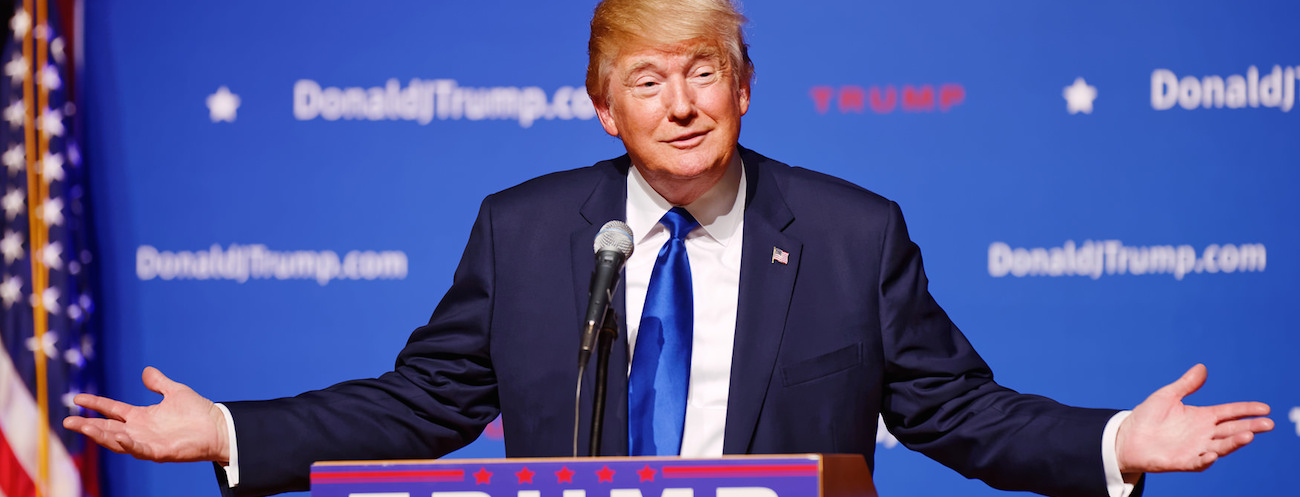Sign up for The Media Today, CJR’s daily newsletter.
The presidential debates and their aftermath offered many tidbits for language lovers. Nearly as entertaining, though, were the ways people tried to look things up. Google is a wonderful search engine, and it can often anticipate what you’re looking for, but it still records the actual search. Merriam-Webster also tracks what people look up, and frequently comments on their search strategies and results.
The M-W “Trend Watch” blog, in particular, was busy remarking on some words looked up during the debates, including “nasty” (an instant internet meme), “locker-room talk,” and “bigly,” which is a real word, notwithstanding the derision it has drawn.
One phrase that particularly gained traction was “bad hombres,” which Donald Trump used to describe some undocumented immigrants coming over the border with Mexico: “But we have some bad hombres here, and we’re gonna get ’em out,” Trump said.
First, the history of “hombres.” It is a Spanish word, literally meaning “man.” The Oxford English Dictionary says it first entered English usage in 1630 to refer to a man, especially one of Hispanic or Spanish origin. It later came to mean any man, equivalent to “guy.” (That use of “guy” itself is an American invention, the OED says, coming in as late as 1847.) “Guys” can now refer to any group of people, male, female, or mixed, though “folks” might be less offensive when women are involved.
The Concise New Partridge Dictionary of Slang and Unconventional English attributes part of the spread of “hombre” in English to Hollywood westerns, ubiquitous in the 1930s through ’60s (and Paul Newman in the 1967 movie Hombre). It had a neutral flavor, meaning just a man. Partridge says its usage to mean “male friend” may have been “informed by a phonetic similarity to homeboy,” which it traces not to the streets of an American inner city but to the United Kingdom in 2001. But OED and others trace it much earlier: 1861 in the US and South Africa, and 1965 as urban slang.
As Merriam-Webster points out, the phrase “bad hombre” has been in use since at least 1893.
Trump’s comment spurred more instant memes and criticism, some based on his Spanglish and others bordering on the lewd. At least one was based on a homophone of “hombre,” “ombre.” An “ombre” is a shade of color that fades into another, and is a popular hair coloring technique. It’s also spelled “ombré,” comes to English from the French verb “ombrer,” to shade, and it’s related to “umbra,” a shaded area or shadow. (The area of a total eclipse is in the “umbra” cast by the Moon; the areas of partial eclipse are in the “penumbra.”) It’s related not at all to “hombre.”
People running to Merriam-Webster for clarification on “hombre” during the debate instead looked up “ombré” and “ombre.” In a roundabout way, they were correct, at least about “ombre”: it also is an old card game, played with three hands, and originally called–wait for it–“hombre.”
While it’s great that people can type incorrect search terms and still come up with the right answer, it can also be entertaining. During the first debate, Merriam-Webster tweeted that more people were looking up “lepo” than Aleppo. (Gary Johnson, the Libertarian candidate for president, learned that one the hard way.)
Note that more people are looking up ‘lepo-‘ (as in, “what’s a lepo?”) than ‘Aleppo’. #debate https://t.co/SvAqKWp3bz
— Merriam-Webster (@MerriamWebster) October 10, 2016
But people aren’t the only ones making mistakes. ABC News, which automatically transcribed the last debate, could easily set off a meme of its own with its rendering of Trump’s “hombres” comment:
“But we have some bad arm brace here and we’re gonna get him out.”
Has America ever needed a media defender more than now? Help us by joining CJR today.



